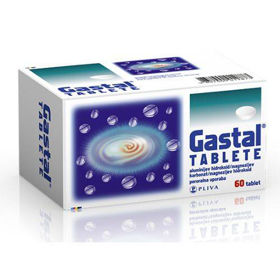Vprašanje stranke:
Kakšni so simptomi stresnega gastritisa? Vprašanje anonimne stranke
Odgovor farmacevta:
Stresni gastritis je stanje, pri katerem je sluznica želodca vneta zaradi stresa, ki vpliva tudi na prebavni sistem. Simptomi stresnega gastritisa se lahko razlikujejo od osebe do osebe in so lahko blagi do intenzivni. Ti simptomi se običajno pojavijo, ko je oseba pod velikim čustvenim ali fizičnim pritiskom, kar vodi do pretiranega izločanja želodčne kisline, kar lahko poškoduje sluznico želodca. Čeprav so simptomi ponavadi neprijetni, se lahko s pravilnim zdravljenjem in upravljanjem stresa običajno olajšajo.
Eden izmed glavnih simptomov stresnega gastritisa je bolečina v zgornjem delu trebuha, ki se lahko razlikuje od blage do hude. Bolečina je pogosto opisana kot pekoče ali ostre narave ter se lahko pojavi takoj po obroku ali pa na prazen želodec. Poleg bolečine se lahko pojavijo tudi drugi prebavni simptomi, kot so slabost, bruhanje, napihnjenost, občutek polnosti in zgaga. Ti simptomi se lahko poslabšajo po uživanju začinjene, mastne ali kisle hrane.
Poleg prebavnih simptomov lahko stresni gastritis povzroči tudi druge telesne težave. Med temi težavami so lahko utrujenost, povečano izločanje sline, motnje spanja, razdražljivost, tesnoba in celo depresija. Ti simptomi so posledica vpliva stresa na celotno telo, ne le na prebavni sistem. Ko telo doživlja kronični stres, lahko to negativno vpliva na imunski sistem, hormonsko ravnovesje in splošno dobro počutje.
Pomembno je omeniti, da simptomi stresnega gastritisa niso vedno očitni ali specifični. Lahko se zamenjajo z drugimi prebavnimi težavami, kot so razjede želodca, refluksna bolezen ali celo srčna bolečina. Zato je pomembno, da se posvetujete s strokovnjakom za prebavne težave, če imate težave s prebavili ali če opazite nenavadne simptome, ki trajajo dlje časa.
Zdravljenje stresnega gastritisa običajno vključuje kombinacijo zdravil, spremembe prehrane in načinov za obvladovanje stresa. Zdravila, kot so zaviralci protonske črpalke ali antacidi, se lahko uporabljajo za zmanjšanje izločanja želodčne kisline in lajšanje simptomov. Prav tako je pomembno spremljati prehrano in se izogibati živilom, ki lahko dražijo želodec, ter se osredotočiti na uravnoteženo prehrano bogato z vlakninami, sadjem in zelenjavo. Poleg tega lahko tehnike sproščanja, kot so joga, meditacija ali globoko dihanje, pomagajo zmanjšati stres in s tem tudi simptome stresnega gastritisa.
Vendar pa je najpomembnejše dolgoročno upravljanje stresa. To lahko vključuje spremembo življenjskega sloga, kot so redna telesna aktivnost, dovolj spanja, vzpostavitev zdravih vzorcev prehranjevanja in iskanje podpore prijateljev, družine ali strokovnjakov za duševno zdravje. Spremembe življenjskega sloga in tehnik za obvladovanje stresa lahko pomagajo preprečiti poslabšanje stresnega gastritisa in izboljšati splošno dobro počutje.
Kako pogost je stresni gastritis?
Stresni gastritis je precej pogosto stanje, ki se lahko pojavi pri ljudeh vseh starosti. Čeprav natančna razširjenost ni vedno jasna, je znano, da je izpostavljenost stresu pogost pojav v sodobnem življenju, kar povečuje tveganje za razvoj te bolezni. Mnogi ljudje doživljajo obdobja intenzivnejšega stresa zaradi delovnih pritiskov, težav v odnosih, finančnih težav ali drugih življenjskih izzivov, kar lahko pripelje do razvoja stresnega gastritisa. Poleg tega so določene skupine ljudi, kot so tisti z anksioznimi motnjami ali depresijo, bolj dovzetni za razvoj prebavnih težav, vključno s stresnim gastritisom.
Medtem ko se stresni gastritis lahko pojavi pri ljudeh vseh starosti, so nekatere skupine ljudi bolj nagnjene k temu stanju. Na primer, ljudje, ki imajo visok stresni življenjski slog ali so izpostavljeni kroničnemu stresu, so bolj dovzetni. Prav tako so tisti, ki imajo že obstoječe prebavne težave, kot so refluksna bolezen ali razjede želodca, bolj nagnjeni k razvoju stresnega gastritisa pod vplivom stresa.
Čeprav se stresni gastritis lahko pojavi kadarkoli, je pomembno omeniti, da se simptomi običajno pojavijo, ko je oseba pod posebnim stresom ali obdobjem močnega čustvenega pritiska. Kljub temu lahko pravilno upravljanje stresa, vključno s spremembami življenjskega sloga in tehnikami sproščanja, pomaga zmanjšati tveganje za razvoj ali poslabšanje stresnega gastritisa.
Kljub temu, da ni natančnih podatkov o pogostosti stresnega gastritisa, je jasno, da je to stanje, ki močno vpliva na kakovost življenja mnogih ljudi in zahteva ustrezno pozornost ter pravočasno zdravljenje. Posvetovanje s strokovnjakom za prebavne težave ali zdravnikom lahko pomaga pri postavitvi diagnoze in izbiri najboljše možnosti zdravljenja posameznika.
Zanimivo branje: Gastritis simptomi
Zanimivo branje: Kronični gastritis forum








 Facebook
Facebook
 Instagram
Instagram
 info@moja-lekarna.com
info@moja-lekarna.com

